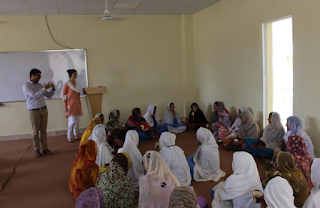881,913 square km of land constitutes Pakistan, out of which 44% is demarcated within the province of Baluchistan. With my educational travels to outskirts of Punjab and the hill station schools in the adventurous mountains of Gilgit Baltistan, I often boast I have experienced sprinkles of education across Pakistan. When advert for workshop in Turbat appeared on Facebook, I googled and was surprised at my ignorance that it is the second biggest city in Baluchistan housing an international airport. Opportunity to volunteer for the camp excited me to explore the unfamiliar terrain, experience an infamously labeled province and decrease some % of personal ignorance.
When 46 degrees does not limit
your excitement, it is the desire to walk the unfamiliar territory and thrill
of meeting some students somewhere that becomes the source of joy and
enthusiasm. A traditional beginning it was; amphi seating - girls on one side,
boys on the other - chief guests in the front, words of appreciation and so on.
The fun started the guests made their way out and the word 'fear' was thrown in
the air. Initial hesitant responses soon converted into courageous and bold
expressions by boys and girls alike: 'zamanay se dar lagta hai, ghar waley
naraz hotay hain, khud se dar lagta hai', and experiences of day to day
struggle started pouring in, receiving permission for the summer camp,
included. At the same time we observed a pattern - after every 5 - 6
expressions of fear came a bold response that the panacea to the fears lie in 'self-belief,
self-motivation, faith and personal courage'. Those interjections altered the energy
in the room.
We the facilitators from rather
privileged backgrounds were amazed to see how conscious these students are.
when day to day acts of waking up without electricity, struggling to reach
school, accessing fuel, water and food due to security concerns, and connecting
with the larger world through internet becomes a struggle and a stimulus to act
courageously, children grow far too soon, and traditional pen and paper
educational systems hardly keep up the pace. As one participant shared her
experience, given that females completing middle school is a privilege,
imagining a participant resisting her parents' decision to pursue arts instead
of medicine is tantamount to bringing a revolt in the system.
Now we felt somewhere confident
where to begin from, and the next three days of 'design thinking' were driven
by their raw experiences and our desire to weave them piece by piece into an
unfamiliar cloth of connection. We had three guiding principles from the Acumen
journey - 'stay present', 'step into the discomfort' and 'trust the process',
along with our host co-facilitator - former Acumen Fellow, Granaz Baloch. She
is a fearless mentor for students who intervened intermittently with inspiring
narration in Baluchi. The power of mother tongue was profoundly evident when
she spoke; unfortunately most students in Pakistan are bereft of the space to
express and experience learning in the language they best understand.
Granaz allowed us to make the
learning space co-educational. A completely unfamiliar experience for the
students, we learnt. From the amphi seats we moved on to the floor, where
students gathered in a non-chaotic yet in-orderly seating arrangement of 4 and
5 together. The students came from 10 different schools across grade 8, 9 and
10, both public and private, along with selected fellows who represented the
diverse departments of Turbat University. All with mixed bag of experiences
shared common systemic challenges, and those were used as pretext to walk
through the different stages of design thinking. Water, transport, health,
education and sports were contextualized by their personal encounters, which in
mix gender groups were identified as alive systems with numerous individual and
institutional stakeholders, and their respective roles. Inevitably students
found themselves and their community one among the stakeholders, and thus a
contributing factor with an agency to act. Many stereotypes also surfaced,
especially towards the opposite gender - 'nahin socha tha larkay bhi kuch
serious sochtay hain'. It was heartwarming to know that students found this
space safe enough to share their misconceptions and allow themselves to be
vulnerable.
